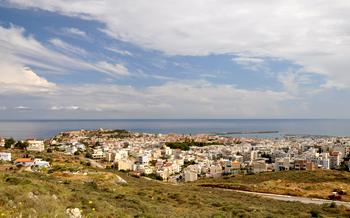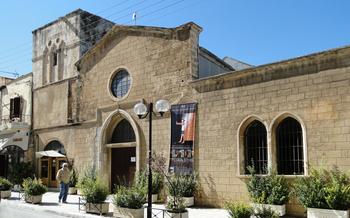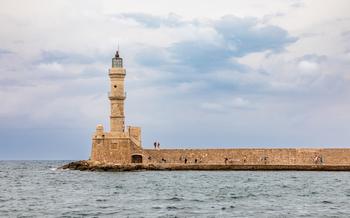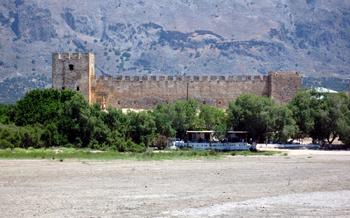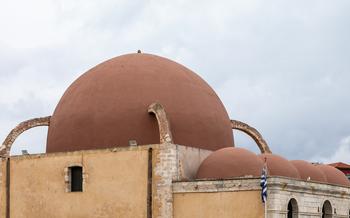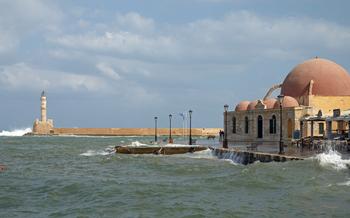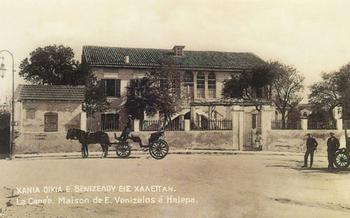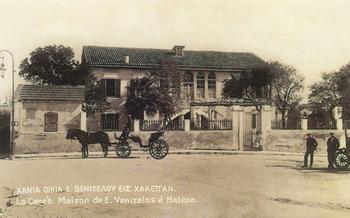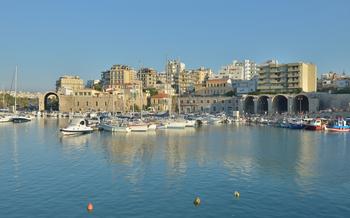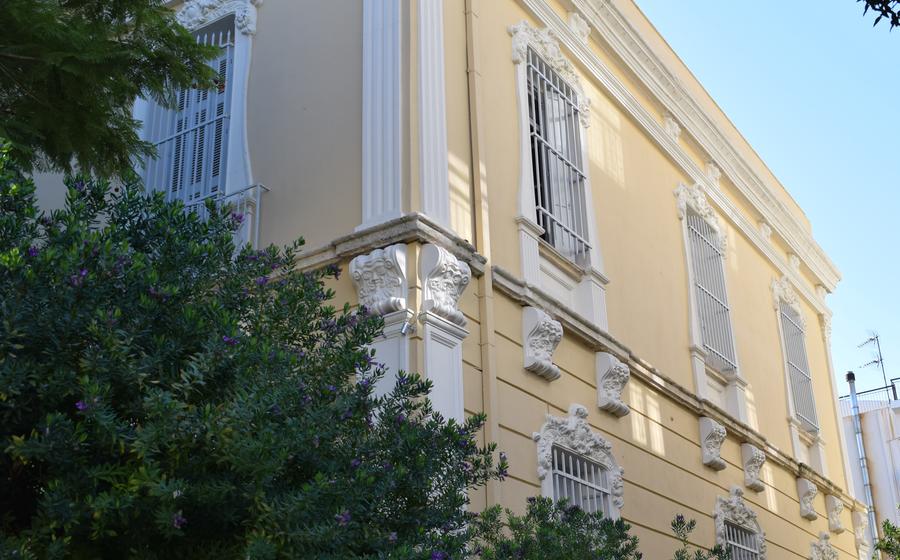
The Historical Archive of Crete
- The Historical Archive of Crete: An Overview
- Documenting Crete's Past
- Ottoman Era Records
- Venetian Rule and Its Legacy
- World War II and the Battle of Crete
- Genealogical Research
- Exhibitions and Events
- Guided Tours and Educational Programs
- Conservation and Preservation Efforts
- Digitalization Projects
- Collaborations and Partnerships
- Publications and Research
- The Archive's Role in Society
- Insider Tip: Exploring the Vibrant Chania Municipal Market
The Historical Archive of Crete: An Overview
The Historical Archive of Crete is a treasure trove of historical documents, providing a comprehensive overview of the island's rich and diverse past. Established in 1919, the archive is home to an extensive collection of manuscripts, official records, photographs, and artifacts spanning from the medieval period to the present day. Located in the heart of Chania, the archive is housed in a beautifully restored Venetian building that adds to its historical significance. Open to the public, the archive offers researchers, scholars, and history enthusiasts the opportunity to delve into Crete's fascinating history and uncover its hidden stories. Whether you are tracing your family roots, exploring the island's cultural heritage, or simply seeking a deeper understanding of Crete's past, the Historical Archive of Crete is an invaluable resource that awaits your discovery.
Documenting Crete's Past
The Historical Archive of Crete is a treasure trove of documents and artifacts that chronicle the island's rich and diverse past. The collection spans various periods, from the Byzantine era to the modern day, with a particular focus on the Venetian and Ottoman periods.
Among the notable documents housed in the archive are medieval manuscripts, land registers, censuses, trade records, personal letters, photographs, and maps. These invaluable sources provide researchers with a wealth of information on Crete's history, society, culture, and economy.
The archive also boasts an impressive collection of rare books, including early editions of Cretan authors, travelogues, and historical accounts. These works offer a unique glimpse into the island's literary and intellectual heritage.
The Historical Archive of Crete is not just a repository of documents; it is a living institution that actively contributes to the study and dissemination of Cretan history. The archive regularly organizes exhibitions, workshops, lectures, and other events to engage with the local community and visitors alike.
Ottoman Era Records
The Historical Archive of Crete houses a wealth of documents from the Ottoman period, offering a glimpse into the island's history under Islamic rule. Land registers, or tapus, meticulously record land ownership and transactions during the Ottoman era. These documents provide valuable insights into the social and economic structures of the time, as well as the interactions between the local population and the Ottoman authorities.
Another notable collection consists of millet registers, which document the non-Muslim population of Crete, including Christians and Jews. These records include information on births, marriages, deaths, and tax payments. Genealogists and historians can delve into these registers to trace the lineages of Cretan families and reconstruct their history during Ottoman rule.
Qadis' court records, or sicills, offer a rich source of information on the legal system and everyday life in Ottoman Crete. These documents provide insights into disputes, crimes, and punishments, shedding light on the social and cultural norms of the period.
By exploring these Ottoman-era records, researchers can gain a deeper understanding of the political, social, and economic dynamics that shaped Crete during this transformative period.
Venetian Rule and Its Legacy
As you delve into the depths of the Historical Archive of Crete, you will uncover a rich tapestry of documents that illuminate the profound impact of Venetian rule on this enchanting island. Among the many treasures, you will find meticulously preserved records of trade and commerce, providing insights into the bustling maritime activities that once flourished here. Explore documents that detail the intricate governance structures established by the Venetian Republic, shaping the political and social landscape of Crete. Furthermore, discover the enduring legacy of Venetian architecture that graces the streets of Chania, a testament to the artistry and influence of this powerful maritime empire.
World War II and the Battle of Crete
The Historical Archive of Crete houses a wealth of documentation related to World War II and the Battle of Crete, which took place in 194This significant collection includes personal accounts, photographs, and artifacts that provide a firsthand glimpse into this tumultuous period. Visitors can explore the archive's holdings to gain insights into the experiences of the Cretan people during the war, including their resistance to the German occupation. The archive's collection offers a poignant reminder of the sacrifices made by the Cretans and their unwavering determination to defend their homeland.
Genealogical Research
The Historical Archive of Crete offers a wealth of resources for genealogical research. Family historians can explore birth, marriage, and death records dating back centuries, providing valuable insights into their ancestral roots in Crete. The archive's knowledgeable staff is available to assist researchers in navigating the collection and uncovering their family's past.
With its extensive collection of documents, the archive has become a hub for genealogists seeking to trace their lineage in Crete. The records are meticulously organized and indexed, making it easier for researchers to locate the information they need. Whether you are looking to confirm family lore or discover new branches of your family tree, the Historical Archive of Crete is an invaluable resource.
The archive also hosts regular workshops and seminars on genealogical research, providing guidance and support to researchers of all levels. These events offer an opportunity to learn from experts in the field, share experiences with other researchers, and delve deeper into the fascinating world of family history.
Exhibitions and Events
The Historical Archive of Crete regularly organizes temporary exhibitions that showcase its diverse collection and highlight specific themes related to Cretan history. These exhibitions offer a unique opportunity to delve deeper into the rich heritage of the island and discover hidden treasures from the archive.
The archive also hosts workshops, lectures, and cultural events throughout the year, providing a platform for scholars, historians, and the general public to engage with the archive's resources and explore various aspects of Cretan history and culture. These events foster a sense of community and encourage dialogue and exchange of ideas.
By participating in exhibitions and events at the Historical Archive of Crete, visitors gain a deeper understanding of the island's past and present, while also contributing to the preservation and promotion of its cultural heritage.
Guided Tours and Educational Programs
The Historical Archive of Crete offers guided tours for visitors who want to explore the archive's collection and learn more about its significance. These tours are led by experienced archivists who provide insights into the history of the archive, the various types of documents it holds, and the research that has been conducted using these materials.
The archive also offers educational programs for students and lifelong learners. These programs are designed to promote historical awareness and appreciation, and to encourage critical thinking skills. The archive's educational programs include workshops, lectures, and guided tours tailored to different age groups and interests.
By offering guided tours and educational programs, the Historical Archive of Crete is fulfilling its mission to preserve and promote Crete's rich historical heritage. These programs provide opportunities for visitors and students to engage with the archive's collection, learn about the history of Crete, and develop a deeper understanding of the region's culture and traditions.
Conservation and Preservation Efforts
The Historical Archive of Crete is committed to preserving its invaluable collection for future generations. Recognizing the fragility of archival materials, the archive has implemented stringent conservation and preservation measures. Expert conservators work tirelessly to assess, clean, and repair documents, ensuring their longevity. Climate control systems maintain optimal temperature and humidity levels, creating a stable environment that minimizes deterioration. The archive also utilizes specialized storage techniques, such as acid-free folders and enclosures, to protect documents from harmful elements. Through these dedicated efforts, the archive ensures that Crete's historical record remains accessible and intact for years to come.
Digitalization Projects
The Historical Archive of Crete is actively engaged in digital initiatives to enhance accessibility and preservation of its vast collection. These projects are crucial in the modern era, allowing researchers and the general public to explore Crete's history from anywhere in the world.
The archive has developed comprehensive online databases that provide digital access to a wide range of documents, including manuscripts, photographs, and maps. These databases are user-friendly and enable researchers to search and browse the collection by keyword, date, or document type.
In addition, the archive has created virtual exhibitions that showcase highlights from the collection. These exhibitions present curated selections of documents and artifacts, accompanied by detailed descriptions and historical context. The virtual exhibitions are accessible on the archive's website and offer a unique opportunity to delve into specific themes and periods of Cretan history.
Through these digitalization projects, the Historical Archive of Crete is ensuring that its invaluable collection is preserved for future generations and made accessible to a global audience. The archive's commitment to digitalization aligns with its mission to promote historical research and foster a greater understanding of Crete's rich cultural heritage.
Collaborations and Partnerships
The Historical Archive of Crete actively collaborates with other institutions to enrich its resources, expand its reach, and contribute to the broader field of historical research. These partnerships include:
-
Universities and Research Centers: The archive collaborates with universities and research centers both in Greece and abroad to conduct joint research projects, organize conferences and workshops, and provide training opportunities for scholars and students.
-
Libraries and Archives: The archive collaborates with libraries and archives in Crete, Greece, and beyond to share resources, expertise, and best practices in archival management and preservation. This collaboration enhances the visibility and accessibility of historical documents and facilitates interdisciplinary research.
-
Cultural and Historical organizations: The archive partners with cultural and historical organizations to promote historical awareness, foster cultural exchange, and engage the local community. These collaborations include exhibitions, lectures, workshops, and educational programs that showcase the rich history of Crete.
-
International Networks: The archive is an active member of international networks of historical archives, such as the International Council on Archives (ICA) and the Association of European Archivists (AEA). These networks provide a platform for knowledge sharing, collaboration on common projects, and the development of international standards for archival management.
Through these collaborations, the Historical Archive of Crete strengthens its position as a leading center for historical research and preservation, contributing to the advancement of knowledge and the promotion of cultural heritage both in Greece and beyond.
Publications and Research
The Historical Archive of Crete is not only a repository of historical documents but also a hub for scholarly research and publication. The archive's dedicated team of researchers and historians is actively engaged in various research projects and publications that contribute to the field of Cretan and Greek history.
One of the archive's notable publications is the scholarly journal "Cretan Historical Review," which features original research articles, book reviews, and conference proceedings. The journal provides a platform for scholars to share their findings on various aspects of Cretan history, from the ancient period to the modern era.
In addition to the journal, the archive publishes monographs and conference proceedings on specific historical topics. These publications often result from research projects conducted by the archive's staff or in collaboration with other institutions. They delve into specific themes or periods in Cretan history, providing in-depth analysis and new insights.
The archive's research and publications contribute to the broader understanding of Crete's rich and complex past. By disseminating knowledge and facilitating scholarly exchange, the archive plays a crucial role in promoting historical research and fostering a deeper appreciation of Crete's cultural heritage.
The Archive's Role in Society
The Historical Archive of Crete is not merely a repository of historical documents; it is an active participant in the cultural and intellectual life of Chania and the broader region. By preserving and disseminating historical knowledge, the archive plays a crucial role in preserving cultural heritage, promoting historical literacy, and fostering a sense of identity and belonging.
Preserving Cultural Heritage:
The archive serves as a guardian of Crete's rich and diverse cultural heritage, ensuring that the stories, experiences, and achievements of past generations are not forgotten. By safeguarding historical documents, manuscripts, and artifacts, the archive contributes to the preservation of Crete's cultural identity and heritage.
Promoting Historical Literacy:
The archive promotes historical literacy by providing access to primary sources and encouraging research and scholarship. Through its educational programs, workshops, and exhibitions, the archive aims to raise awareness of Crete's history and foster a deeper understanding of the past.
Fostering a Sense of Identity and Belonging:
By preserving and showcasing Crete's history, the archive helps to strengthen the sense of identity and belonging among the local population. The archive's collections provide a tangible connection to the past, allowing Cretans to trace their roots and understand the historical forces that have shaped their culture and society.
Insider Tip: Exploring the Vibrant Chania Municipal Market
After delving into the rich history of Crete at the Historical Archive, take a short stroll to the nearby Chania Municipal Market to experience the vibrant atmosphere and local flavors of the city. This bustling marketplace offers a delightful array of fresh produce, spices, herbs, and traditional Cretan products. Engage with the friendly vendors, sample local delicacies, and soak up the lively ambiance. Once you've explored the market, indulge in a delicious Cretan meal at one of the nearby tavernas, savoring the authentic flavors of the island.
